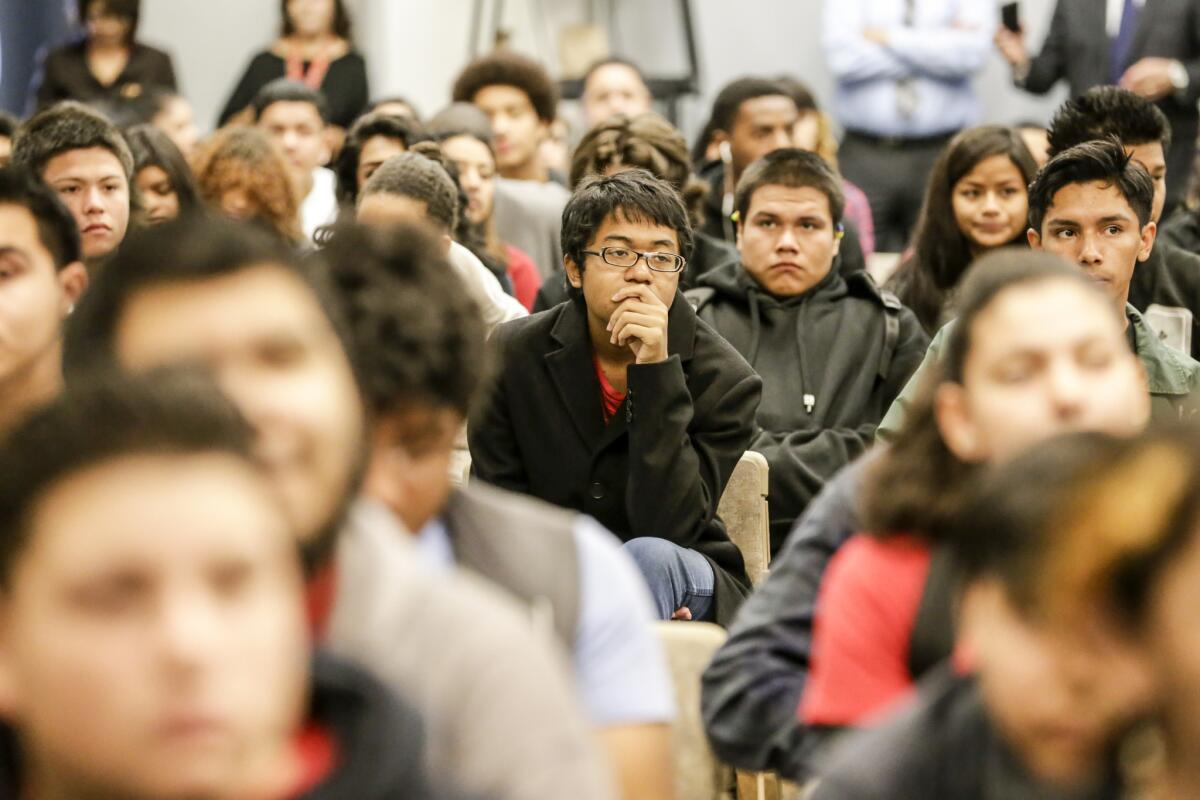Are charter schools suspending too many students?

The suspensions rate at charter schools is 16 percent higher than at traditional public schools.
- Share via
Every day teachers nationwide balance the tension between instructing attentive students and dealing fairly with those who disrupt classes.
A study released late Wednesday reports that charter schools across the country suspended students at a higher rate than traditional public schools. But the results reflect data that’s a few years old, and between then and now, much has changed in the ways schools discipline their students.
Produced by UCLA’s Civil Rights Project, the report relies on a survey that required every public and charter school in America to submit information including its suspension rates to the federal government.
In the 2011-12 school year, charter schools had an average out-of-school suspension rate of 7.8%, as opposed to 6.7% in traditional public schools — meaning the rate in charter schools was 16% higher.
But a lot has changed since the survey was administered, in part because the topic of school discipline has become a flash point in the debate about racial equity after videos of students being physically or verbally punished in classrooms attracted media attention.
Federal data have shown that minority students and students with disabilities are suspended at higher rates than their peers. The new federal Every Student Succeeds Act requires that states review schools to reduce an “overuse of suspension.”
Still, school administrators haven’t settled on a clear answer to what constitutes good, positive school discipline.
The UCLA report chose out-of-school suspensions as its metric for defining discipline. In 2013, the Los Angeles Unified School District voted to ban suspensions for students engaged in “willful defiance.” Instead, teachers are supposed to try other means, such as conflict resolution, to get their classrooms in line.
Teachers across the district have said that they haven’t been adequately trained in these new methods -- which makes the suspension ban all the more difficult to enforce.
Still, the ban caused L.A. Unified’s suspension rate to fall from 8% in 2007-08 to 0.55% last school year.
The study comes as L.A. Unified considers a major push to expand the number of charter schools in the nation’s second-biggest district.
Nina Rees, president of the National Alliance for Public Charter Schools, said the report does not reflect recent efforts to reduce suspensions in the charter school sectors of Washington, D.C., and New Orleans.
Dan Losen, the new study’s author, suggested using the information as a baseline for comparing results against more recent state-level studies and as a way of measuring future progress.
You can look at the school-level results by clicking here to access a spreadsheet produced by the UCLA researchers.
You can reach Joy Resmovits on Twitter @Joy_Resmovits and by email at [email protected].
Editor’s Note: The Times receives funding for its Education Matters digital initiative from several groups that support the charter school movement. The California Community Foundation and United Way of Greater Los Angeles administer grants from the Baxter Family Foundation, the Broad Foundation, the California Endowment and the Wasserman Foundation to support this effort. Under terms of the grants, The Times retains complete control over editorial content.
MORE FROM EDUCATION
2 arrested after racist graffiti found at Palisades Charter High School
UC proposal on intolerance says ‘anti-Zionism’ is unacceptable on campus
Vaccination aversion has fueled measles and whooping cough outbreaks, study finds
More to Read
Sign up for Essential California
The most important California stories and recommendations in your inbox every morning.
You may occasionally receive promotional content from the Los Angeles Times.











